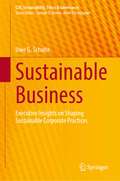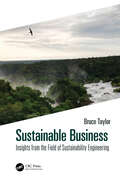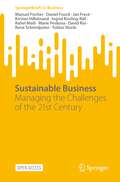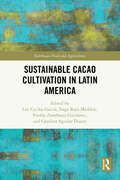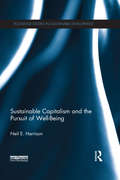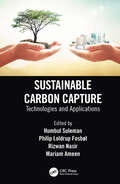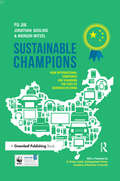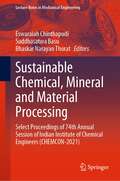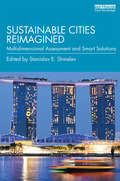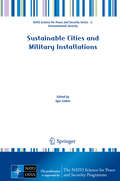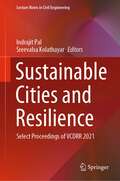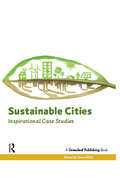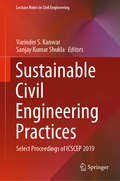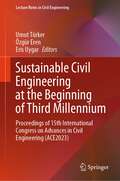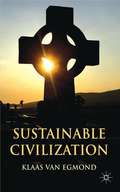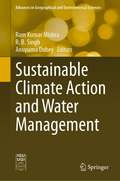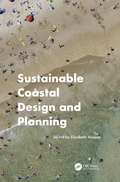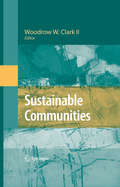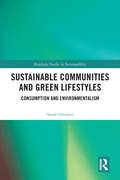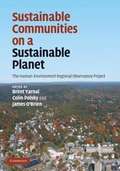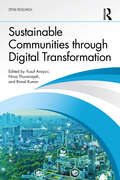- Table View
- List View
Sustainable Business in the Era of Digital Transformation: Strategic and Entrepreneurial Perspectives (ISSN)
by Vesna Zabkar Marek Ćwiklicki Mariusz Sołtysik Magdalena Wojnarowska Maria Urbaniec Erica VareseSustainable development is a complex issue and despite many studies and publications in recent years, it remains poorly recognised on best practices in core business areas. Achieving the Sustainable Development Goals in accordance with the 2030 Agenda for Sustainable Development depends on research and innovation. Therefore, the transition to sustainable development requires investment in technology, new business models, and social and environmental innovations that contribute to shaping new business and promoting sustainable business practices.This book seeks to understand how sustainability affects core business areas, with a focus on strategic and entrepreneurial activities. Given these considerations, the main purpose of this book is twofold: (1) to contribute to a better understanding of important and current trends in the field of sustainable transformation in core business areas; and (2) to provide a comprehensive overview of quantitative and qualitative studies in the field. The book ultimately seeks to shed light on how companies are implementing sustainable transformation in the core areas of product and marketing, entrepreneurship, and innovation, which is supported by appropriate project management strategies.The book provides researchers and upper-level students in economics, business, and other social sciences with an overview of interdisciplinary theoretical and conceptual perspectives and frameworks for successful business transformation. It will be of particular value to those researching sustainable development and strategic management.
Sustainable Business: Executive Insights on Shaping Sustainable Corporate Practices (CSR, Sustainability, Ethics & Governance)
by Uwe G. SchulteThis book presents discussions with corporate practitioners on several topics around sustainability. Between May 2019 and November 2022, the author engaged in dialogues with Senior Executives representing major multinational corporations, overseeing their corporate sustainability endeavours. The thematic spectrum of these conversations encompassed diverse topics such as The United Nations Sustainable Development Goals, Water-stressed regions, Ocean Plastic, Chemical Recycling, Renewable Energy, Sustainable Tourism, and the Just Transition, among others, with each episode concentrating on a singular subject. In this book supporting illustrations and graphs together with background references enrich the insights the conversations convey. The reader will learn about the sustainability challenges companies are facing and how they approach them. The book gives examples of sustainable solutions and international collaborations around greenhouse gas reduction, circular economy, restorative tourism as well as reducing plastic pollution and other global sustainability challenges.
Sustainable Business: Insights from the Field of Sustainability Engineering
by Bruce TaylorEngineers have applied science to land people on the moon, design the cars we drive, and cram the power of a 20th-century supercomputer into the phones we carry. But what can happen when engineering’s systemic problem-solving skills are applied to improving the sustainability of business?This book stands on the shoulders of sustainability engineering insights to supplement business, engineering, and environmental curricula with tools necessary to effectively and efficiently improve the sustainability of organizations. Cutting through the clutter of terminology and approaches, this book uses case studies to outline a proven path to profitably secure “net zero” for facilities and their supply chains. And rather than stopping at the uninspiring target of “doing no harm,” it further empowers businesses and other organizations to create additional economic, environmental, and social benefits.This book: Offers numerous case studies from the Space Shuttle through the world’s first carbon neutral major food company to appropriate technology for safe water in developing countries to illustrate how to reduce environmental footprints while increasing profit margin and business value Explores redemptive entrepreneurship through the lens of the author’s founding of an award-winning engineering firm Presents strategies to strengthen the curricula of engineering, business, accounting, and procurement programs by uncovering significant sources of untapped value in conventional teaching
Sustainable Business: Key Issues
by John Blewitt Helen KopninaSustainable Business: Key Issues is the first comprehensive introductory-level textbook to address the interface between environmental challenges and business solutions to provide an overview of the basic concepts of sustainability, sustainable business, and business ethics. The book introduces students to the background and key issues of sustainability and suggests ways in which these concepts can be applied in business practice. Though the book takes a business perspective, it is interdisciplinary in its nature and draws on knowledge from socio-economic, political, and environmental studies, thereby providing a practical and critical understanding of sustainability in the changing paradigm of global business. It goes beyond the conventional theories of sustainability and addresses critical issues concerned with population, consumption and economic growth. It discusses realistic ways forward, in particular the Circular Economy and Cradle to Cradle frameworks. The book is both a theoretical and practical study guide for undergraduate and postgraduate international students of broad areas of sustainability, teaching ways to recognize opportunities for innovation and entrepreneurship at the intersection of environmental, economic, ethical, and social systems. It takes a strategic approach in applying the power of business methods and policy to address issues of global importance such as climate change, poverty, ecosystem degradation and human rights. This textbook is essential reading for students of business, management and sustainability courses. It is written in an engaging and accessible style, with each chapter including case studies, discussion questions, end of chapter summaries and suggestions for further reading.
Sustainable Business: Key Issues (Key Issues in Environment and Sustainability)
by John Blewitt Helen KopninaSustainable Business: Key Issues is the first comprehensive introductory-level textbook to address the interface between environmental challenges and business solutions to provide an overview of the basic concepts of sustainability, sustainable business, and business ethics. The book introduces students to the background and key issues of sustainability and suggests ways in which these concepts can be applied in business practice. Though the book takes a business perspective, it is interdisciplinary in its nature and draws on knowledge from socio-economic, political, and environmental studies, thereby providing a practical and critical understanding of sustainability in the changing paradigm of global business. It goes beyond the conventional theories of sustainability and addresses critical issues concerned with population, consumption, and economic growth. It discusses realistic ways forward, in particular the circular economy and Cradle to Cradle frameworks. The book is both a theoretical and practical study guide for undergraduate and postgraduate international students of broad areas of sustainability, teaching ways to recognize opportunities for innovation and entrepreneurship at the intersection of environmental, economic, ethical, and social systems. It takes a strategic approach in applying the power of business methods and policy to address issues of global importance such as climate change, poverty, ecosystem degradation, and human rights. This textbook is essential reading for students of business, management, and sustainability courses. It is written in an engaging and accessible style, with each chapter including case studies, discussion questions, end of chapter summaries, and suggestions for further reading. This new edition is updated throughout, and contains an additional chapter on the circular economy.
Sustainable Business: Key Issues (Key Issues in Environment and Sustainability)
by Helen Kopnina Rory Padfield Josephine MylanSustainable Business: Key Issues is the first comprehensive introductory-level textbook to address the interface between environmental challenges and business solutions to provide an overview of the basic concepts of sustainability, sustainable business, and business ethics. Fully updated for the third edition to take into account recent developments and trends, such as the climate emergency, COVID-19, and supply chain sustainability, this textbook introduces students to the background and key issues of sustainability and suggests ways in which these concepts can be applied in business practice. Though the book takes a business perspective, it is interdisciplinary in its nature and draws on knowledge from socio-economic, political, and environmental studies, thereby providing a critical understanding of sustainability in the changing paradigm of global business. It goes beyond the conventional theories of sustainability and addresses critical issues concerned with population, consumption, and economic growth. It discusses realistic ways forward, in particular, the circular economy and Cradle to Cradle frameworks. The book is both a theoretical and a practical study guide for undergraduate and postgraduate students of broad areas of sustainability, teaching ways to recognize opportunities for innovation and entrepreneurship at the intersection of environmental, economic, ethical, and social systems. It takes a strategic approach in applying the power of business methods and policy to address issues of global importance such as climate change, poverty, ecosystem degradation, and human rights. This textbook is essential reading for students of business, management, and sustainability courses. It is written in an engaging and accessible style, with each chapter including case studies, discussion questions, and end of chapter summaries.
Sustainable Business: Managing the Challenges of the 21st Century (SpringerBriefs in Business)
by René Schmidpeter Manuel Fischer David Risi Ingrid Kissling-Näf Daniel Foord Jan Frecè Kirsten Hillebrand Rahel Meili Marie Peskova Tobias StuckiThis open access book is a compact guide to the development of sustainable business, which has become the central concept in discussions about the future development of humanity and planet earth. It provides basic terminology and concepts on sustainable business and offers insights into a new management paradigm that integrates social and environmental dimensions into business models, strategies, and operations. New business concepts such as the donut economy, the circular economy, social innovation and sustainable leadership are introduced and the book outlines how they influence the way we run businesses today and in the future. This book lays the foundation for new management thinking in business and academia, making it a essential reader for professionals and students alike.
Sustainable Cacao Cultivation in Latin America (Earthscan Food and Agriculture)
by Naga Raju Maddela Luz Cecilia García Freddy Zambrano Gavilanes Carolina Aguilar DuarteThis book examines cacao cultivation with a view to improving the sustainable management and production of this crop.Theobroma cacao is an important species originating in the Ecuadorian Amazon and its product chocolate is consumed worldwide. Cacao cultivation is an industry supporting over ten million people, and so it is vitally important, in this changing climate, that the species is properly and sustainably managed and cultivated. This book brings together a wide range of experts from across the globe to examine cacao cultivation, from the basic aspects of reproduction, genetic improvement, nutrition and pest management, to agroforestry, industrialization and marketing in a global food system. Case studies are drawn from across Latin America, but the research reflects the nature of a crop that is cultivated in over 60 countries and processed, manufactured and consumed worldwide.This book will be of great interest to students and scholars of agronomy, sustainable agriculture, and crop science.
Sustainable Capitalism and the Pursuit of Well-Being (Routledge Studies in Sustainable Development)
by Neil E. HarrisonSustainable development is the central challenge of the 21st Century. How can human civilization continue to develop without destroying the natural systems on which it depends?Environmentalists tell us that capitalism is the problem because it feeds our self-interest. They tell us that we have to restrain ourselves and only consume what the Earth can sustain. Or governments must tell us what we can and cannot buy. This book uses the science of complex systems to explain why governments cannot deliver sustainability or happiness and how self-interest can be used to make society sustainable. Capitalism won the Cold War; until the Great Recession of 2008, it seemed to be the perfect system. But more of us are unhappy even as it has ravaged the planet. The central problem is the paradigm on which our social systems are founded that more (consumption, production, possessions) is always better. Based on research from political economy, philosophy, and psychology, this book shows that the problem is not self-interest. We are unhappy because we have been taught that our interests are material and that buying 'stuff' will make us happy. Yet, social pressure to consume only prevents us from satisfying our basic psychological needs and fully enjoying life. For that we need to pursue our personal well-being. Because this also reduces our material consumption, environmental sustainability comes from each of us knowing what's truly good for our selves. Even without the constant economic growth that harms the planet and damages our lives, capitalism also is sustainable. This book will be of interest to scholars and students of sustainability;civil societyactivists and social entrepreneurs; thought leaders and policymakers. .
Sustainable Carbon Capture: Technologies and Applications
by Humbul Suleman Philip Loldrup Fosbøl Rizwan Nasir Mariam AmeenA comprehensive resource on different aspects of sustainable carbon capture technologies including recent process developments, environmentally friendly methods, and roadmaps for implementations. It discusses also the socio-economic and policy aspects of carbon capture and the challenges, opportunities, and incentives for change with a focus on industry, policy, and governmental sector. Through applications in various fields of environmental health, and four selected case studies from four different practical regimes of carbon capture, the book provides guidelines for sustainable and responsible carbon capture and addresses current and future global energy, environment, and climate concerns.
Sustainable Champions: How International Companies are Changing the Face of Business in China
by Jonathan Gosling Morgen Witzel Fu JiaIn the face of strong competitive pressure and a dynamic market, multinational companies in China are forced to innovate with extraordinary pace and inventiveness. Environmental sustainability is a vital benchmark, and is a key driver for the best companies in each sector – many of them allied with the WWF Climate Savers programme.Sustainable Champions shows how nine leading multinational companies – including Nestlé, HP, Tetra Pak and Sony – are dealing with environmental, supply chain and ethical challenges in China. The book illuminates some of their transformative practices, and the impact this is having on business in China and beyond. The concluding cross-case analysis of supply chain and environmental challenges faced by leading international firms presents key lessons for business and for sustainability champions.Sustainable Champions: How International Companies are Changing the Face of Business in China is essential reading for researchers and course leaders seeking on-the-ground examples of local environmental challenges, and any company doing business in one of the world’s fastest-growing economies.With a Foreword by Simon Zadek, Distinguished Fellow, Academy of Business in Society, Visiting Scholar, Tsinghua School of Economics and Management.
Sustainable Chemical, Mineral and Material Processing: Select proceedings of 74th Annual Session of Indian Institute of Chemical Engineers (CHEMCON-2021) (Lecture Notes in Mechanical Engineering)
by Suddhasatwa Basu Eswaraiah Chinthapudi Bhaskar Narayan ThoratThis book presents select proceedings of the Indian Chemical Engineering Congress (CHEMCON-2021) under the theme "Sustainable Utilization of Resources for Chemical Mineral Sectors". It covers broad topics such as chemical reaction and processes, material science and engineering, coal and mineral processing, pyro- and hydro-metallurgical processes, environmental engineering and waste management, advanced engineering, and energy materials. This book is useful for the researchers, professionals, and policymakers interested in sustainable utilization of chemical and mineral resources.
Sustainable Cities Reimagined: Multidimensional Assessment and Smart Solutions
by Stanislav ShmelevTo assess urban sustainability performance, this book explores several clusters of cities, including megacities, cities of the Global South, European and North American cities, cities of the Middle East and North Africa, cities of Central and South East Asia, a city state of Singapore and a large group of global cities. It applies a multi-criteria approach using a panel of environmental, economic, social and smart indicators to assess progress and policies in global cities including London, New York, Hong Kong, San Francisco, Los Angeles, São Paolo, Rio de Janeiro, Buenos Aires, Paris, Berlin, Stockholm, Moscow, Beijing, Seoul, Singapore, Shanghai, Sydney, Tokyo and many others. Additional attention is given to the issues of climate change, poverty and smart dimensions, with renewable energy and the drivers of urban CO2 emissions playing the central role. This book is abundant with case studies considering strategies, policies and performance of the leading cities, including San Francisco, Stockholm and Seoul in greater depth, exploring how their successes can be used by other cities. The book identifies key linkages between different smart and sustainability dimensions as well as investment opportunities in cities with sustainability potential. This book will be of great interest to policy makers, city and regional authorities as well as scholars and students of urban planning and sustainable development aiming to facilitate a sustainability transition in our cities around the world.
Sustainable Cities and Military Installations
by Igor LinkovAccess to reliable and affordable energy, water, and services is an important determinant of the prosperity of cities along with effective mission sustainment at military installations. The idea for this book was conceived at the NATO Advanced Research Workshop (ARW) in June 2012 in Hella, Iceland. The workshop was attended by 50 scientists, engineers, and policymakers representing 15 different nations and multiple fields of expertise, reflecting the global and interdisciplinary nature of climate change and sustainability research. The focus of the workshop was on ways in which military installations and small cities can integrate energy, water, and infrastructure sustainability strategies into city and installation management plans that account for climate change uncertainties. The organization of the book reflects major topic sessions and discussions during the workshop.
Sustainable Cities and Resilience: Select Proceedings of VCDRR 2021 (Lecture Notes in Civil Engineering #183)
by Indrajit Pal Sreevalsa KolathayarThis book presents the select proceedings of the Virtual Conference on Disaster Risk Reduction (VCDRR 2021). It provides insights on urban resilience and sustainable infrastructure. All the chapters in this volume are segregated into five clusters, e.g., Resilient infrastructure in construction, Innovative construction interventions, Waste Management and Disaster Risk Reduction, Urban Development and Sustainability, and Cross-cutting issues. Various topics covered in this book are risk assessment, prevention, mitigation, preparedness and response, renewable energy, waste management, resilient cities, and environmental management. This book is a comprehensive volume on disaster risk reduction (DRR) and its management for a sustainable built environment. This book will be useful for the students, researchers, policy makers and professionals working in the area of civil engineering, especially disaster management.
Sustainable Cities: Inspirational Case Studies
by Simon MillsWinners and nominees of the 2013/14 Sustainable City Awards present their case stories in a new collection, Sustainable Cities: Inspirational Case Studies. These short, easy-to-read stories will serve as an inspiration to others around the world in the quest to make our cities more sustainable.The awards were established in 2001 by the City of London Corporation and aim to recognise and reward organisations that have demonstrated excellence in sustainable development. Sustainable Cities is published by Greenleaf Publishing in association with the City of London.
Sustainable Civil Engineering Practices: Select Proceedings of ICSCEP 2019 (Lecture Notes in Civil Engineering #72)
by Sanjay Kumar Shukla Varinder S. KanwarThis book comprises select proceedings of the International Conference on Sustainable Civil Engineering Practices (ICSCEP 2019). It covers several important aspects of sustainable civil engineering practices dealing with effective waste and material management, natural resources, industrial products, energy, food, transportation and shelter, while conserving and protecting the environmental quality and the natural resource base essential for future development. The book also discusses engineering solutions to sustainable development and green design issues. Special emphasis is given on qualitative guidelines for generation, treatment, handling, transport, disposal and recycling of wastes. The book is intended as a practice-oriented reference guide for researchers and practitioners, and will be useful for all working in sustainable civil engineering related fields.
Sustainable Civil Engineering at the Beginning of Third Millennium: Proceedings of 15th International Congress on Advances in Civil Engineering (ACE2023) (Lecture Notes in Civil Engineering #481)
by Umut Türker Eris Uygar Özgür ErenThis volume comprises selected peer-reviewed proceedings of 15th International Congress on Advances in Civil Engineering (ACE 2023) was held in Famagusta, North Cyprus in September 2023. This proceedings covers all disciplines of Civil Engineering classified under six main topics: Construction Management, Hydraulics, Geotechnics, Materials, Structures, Transportation, and Civil Engineering Education. It covers highly diverse research topics including investigation in the areas of innovative materials in concrete production, recycling of waste in the construction industry, fibre reinforced and high strength concrete, soil stabilization, problematic soils of semi-arid and arid regions, deep foundations, staged construction modelling, repair and maintenance of reinforced concrete, earthquake engineering and seismic retrofitting, coastal and harbour engineering, water resources management, hydrology & hydraulics engineering, traffic engineering and urban transport, life cycle cost analysis, decision making strategies.
Sustainable Civilization
by Klaas Van EgmondWestern civilization has entered a new fundamental crisis that can be explained by a very one-sided orientation of social values based on materialism and egocentrism, which is disrupting the delicate balance between the opposing forces of 'mind' and 'matter', and of 'I' and 'the others'. Many sources from the great works of philosophy, religion, art and culture to social surveys and the course of history qualify sustainability as the dynamic equilibrium between fundamental opposing forces. This insight and the ethical ability to better discriminate between stabilizing and destabilizing forces would allow further justification of human rights and new institutional arrangements in society at large and, in particular, in politics, economy and finance. It would enable a sustainable civilization to flourish within the boundaries of freedom and human dignity. "
Sustainable Climate Action and Water Management (Advances in Geographical and Environmental Sciences)
by Ram Kumar Mishra R. B. Singh Anupama DubeyThis book discusses various issues relating to water resources, climate change and sustainable development. Water is the main driving force behind three major pillars of sustainable development: environmental, social and economic. As stated in the United Nations Sustainable Development Goals, development of these pillars rests on the availability and management of resources to fulfill the demand for water. By identifying the various challenges in the context of water resources and climate change, the book offers insights into achieving a better and more sustainable future. It provides a unique forum for practitioners and academics to exchange ideas on emerging issues, approaches, and practices in the area of water resources, climate change, and sustainability, while also presenting valuable information for policymakers on the changing contours of water management and climate change mitigation. As such it is a useful resource for decision-makers at the local as well as the global level.
Sustainable Coastal Design and Planning
by Elizabeth MossopAs different parts of the globe deal with the challenges of coastal settlements in the Anthropcene landscape of increasing uncertainty, the methods of design offer new strategies for developing and testing solutions. These complex problems require collaboration across disciplines, with scientists, planners, engineers, designers, and others able to work together in finding new ways of living in coastal and changing landscapes. Sustainable Coastal Design and Planning is an outstanding collection of essays by leading practitioners and academics from across the globe on design and planning for coastal resilience in the face of climate change. It thoroughly explores the questions of coastal change at different scales and provides international case studies that illustrate diverse strategies in different geographies and cultures. Taken as a whole, they canvas a broad palette of approaches and techniques for engaging these complex problems. Divided in two parts, this book focuses on how to develop solutions through multidisciplinary design thinking and informs all stakeholders on specific methods and practices that will be needed to work effectively in this dynamic space.
Sustainable Communities
by Woodrow W. Clark IIThe book starts with a discussion of global warming and climate change. The problem is well documented. Part One gives background for sustainable developments and gives studies of proven, substantiated and documented solutions. The time to act has begun. The "Green Revolution" has begun. Some authors call it The Third Industrial Revolution (Rifkin, 2005) since in the 21st century the industrially developed world has begun to move rapidly from fossil fuels (The Second Industrial Revolution) to renewable energy generation, storage technologies, and sustainable communities. Now is the time to understand and learn the tools that make sustainable communities of all kinds real. The book provides a vast, but not the total, amount of materials and data. The intent is to give students of sustainable development some well-established resources and tools. By 2008, the concept of "Green" had been so much in marketing and product services that it lost its meaning. The "branding" of green meant a whole new industrial sector suddenly emerged globally. However, the proof that there is both a Green Revolution and actual solutions to global warming must be seen in those sustainable communities who have existed, grown or developed using tested tools for sustainability. One of the key tools is the concern for conservation of natural resources, energy efficiency and the use of renewable energy systems (solar, wind, geothermal and bio-mass among others) along with storage devices for power generation. Communities in Europe and Asia have lead the way historically. The book presents actual cases of sustainable communities. The case of Frederikshavn in Denmark (Chapter # 6) clearly illustrates how small towns and villages can be sustainable. Far more intuitive and with common sense, Dos Lagos in California (Chapter #4) demonstrates how concern for the natural environment can create a mix-use community of homes, shops, offices and a golf course. Far more planned and strategic are the nine college campuses of the Los Angeles Community College District (Chapter #3) who recognized that public policy and that sector must lead the private sector by example as well as by proving the tools and economics of sustainable communities. And the private sector took note. A number of private companies from Safeway with its 20+ energy independent storage facilities to Toyota with Platinum LEED (Leadership in Environment and Energy Design) USA Headquarters in Torrance, California. Honda was not far behind with its "Green Hydrogen" Refueling station that electronizes solar energy into hydrogen for its hydrogen fuel cell cars. The Green Revolution could be seen with the hybrid cars that lead Toyota to be the No #1 Auto maker. Part Two of the book reviews the tools needed to make sustainable communities anywhere in the world. The key one is the technology (s) from science and engineering (Chapter #8). All too often people do not know that there are environmentally sound technologies that exist today (Clark, 2000) to make communities sustainable. Then when the political leaders discover that the technologies exist they argue that the costs are too high. Not true. And certainly not true today as Chapter #9 clearly demonstrates. There is the need to rethink basic cost benefit analyses for goods and services as being in the short term (2-3 years) into life cycle analyses (1-20 years) along with triple bottom line benefits and externality economic impacts on health, pollution and the atmosphere. In the end sustainable communities must be just that: capable of producing and using their own resources. Global warming starts and can end locally. If they need resources from outside or a long distance away, then those needs must be environmentally sound in terms of the goods themselves. And especially they must be sustainable in terms of transportation and services. This local and global change means new paradigms and approaches in public policy, environmentally sound technologies, economics and systems must be implemented today. Such a sustainable ...
Sustainable Communities and Green Lifestyles: Consumption and Environmentalism (Routledge Studies in Sustainability)
by Tendai ChitewereSustainable communities raise questions about the compatibility of capitalism and environmentalism and how we can green our way of life in a capitalist economy that values short-term production and consumption over long-term conservation and simple living. If capitalism and its drive towards consumption has produced social and environmental degradation, is it the best medium to identify solutions? Sustainable Communities and Green Lifestyles examines one ecovillage as it attempts to create a sense of community while reducing its impact on the natural environment. Through extensive participant observation, the book demonstrates how ecovillages are immersed within a larger discourse of class, race, and lifestyle choices, highlighting the inseparability of environmental sustainability and social justice. Sustainable communities are confronted by the contradictions of green consumption and must address social inequality or risk focusing inward on personal green consumerism, creating mere green havens for the few who can afford to live in them. This book, cautious of redirecting environmentalist efforts away from structural solutions and onto personal environmentalism, offers a critical perspective on the challenges of an emerging green lifestyle. This book offers a critical perspective on the direction of US environmentalism and contributes to debates in environmental studies, anthropology, and urban planning.
Sustainable Communities on a Sustainable Planet: The Human-environment Regional Observatory Project
by Brent Yarnal Colin Polsky James O'BrienScientists and policymakers have realized that localities are central to addressing the causes and consequences of global environmental change. The goal of the Human-Environment Regional Observatory project (HERO) was to develop the infrastructure necessary to monitor and understand the local dimensions of global change. This book presents the philosophy behind HERO, the methods used to put that philosophy into action, its results, and the lessons learned from the project. HERO used three strategies: it developed research protocols and data standards for collecting data; it built a web-based networking environment to help investigators share data, analyses and ideas from remote locations; and investigators field-tested these concepts by applying them in diverse biophysical and socioeconomic settings - central Massachusetts, central Pennsylvania, southwestern Kansas, and the US-Mexico border region of Arizona. The book highlights the unique focus of HERO regarding thinking and acting on complex, integrative, and interdisciplinary global change science at local scales, and is valuable for global change scientists.
Sustainable Communities through Digital Transformation (Spon Research)
by Yusuf Arayici Niraj Thurairajah Bimal KumarThis book brings together cutting-edge exploratory research findings to show how a vision for sustainable communities can be enabled by digital transformation. It attempts to apply existing knowledge about digital transformation and sustainable communities and compare, interpret, diagnose, and evaluate a variety of digital solutions to ascertain their suitability for the delivery of a more sustainable built environment. Chapters examine a breadth of issues including how digital transformations could: Provide digital/physical working/living environments that anticipate emerging lifestyles Blend digital engagements into the physical engagements within the built environment Support business and social activity in physical and online venues Use advanced information and community-oriented technologies for efficient management of urban services Promote sustainability Express narratives that celebrate the experience of place and community Leverage transformation of educational systems Foster linkages between universities, and between universities and businesses Facilitate working relationships among small and large companies Foster new processes and arrangements for innovation in the built environment By comparing the key principles of digital transformation with those of sustainable communities, the contributors seek to justify or discount the applicability of digital change for achieving more sustainable communities. The research presented in this book is essential reading for architecture, urban planning, quantity surveying, building surveying, real estate, and construction management professionals and academics.

